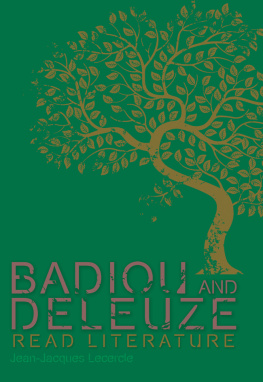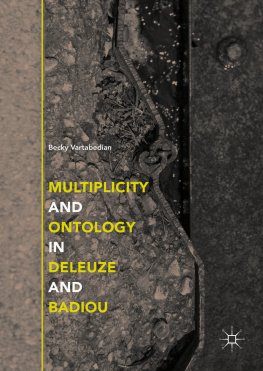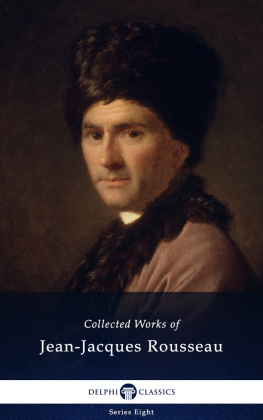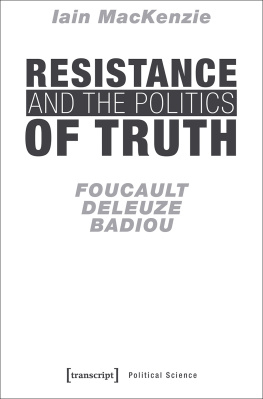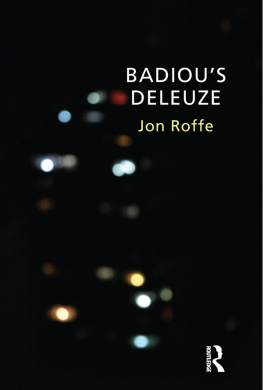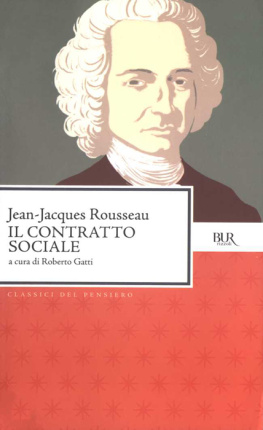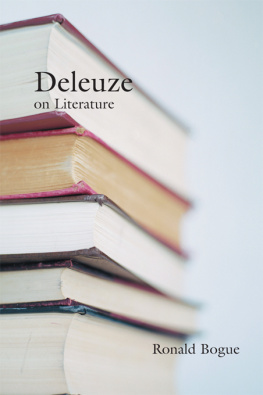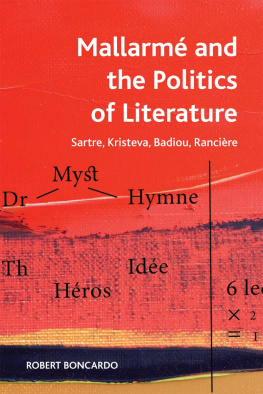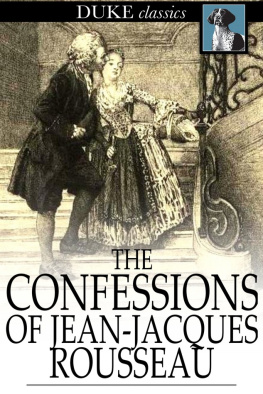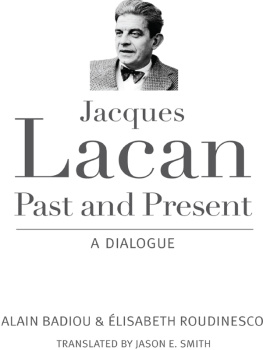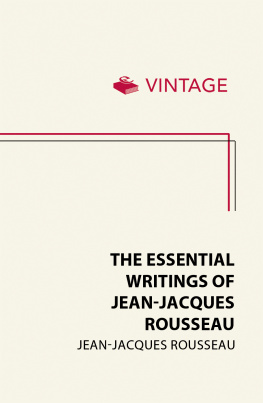Jean-Jacques Lecercle - Badiou and Deleuze Read Literature
Here you can read online Jean-Jacques Lecercle - Badiou and Deleuze Read Literature full text of the book (entire story) in english for free. Download pdf and epub, get meaning, cover and reviews about this ebook. City: Edinburgh, year: 2010, publisher: Edinburgh University Press, genre: Detective and thriller. Description of the work, (preface) as well as reviews are available. Best literature library LitArk.com created for fans of good reading and offers a wide selection of genres:
Romance novel
Science fiction
Adventure
Detective
Science
History
Home and family
Prose
Art
Politics
Computer
Non-fiction
Religion
Business
Children
Humor
Choose a favorite category and find really read worthwhile books. Enjoy immersion in the world of imagination, feel the emotions of the characters or learn something new for yourself, make an fascinating discovery.
- Book:Badiou and Deleuze Read Literature
- Author:
- Publisher:Edinburgh University Press
- Genre:
- Year:2010
- City:Edinburgh
- Rating:3 / 5
- Favourites:Add to favourites
- Your mark:
- 60
- 1
- 2
- 3
- 4
- 5
Badiou and Deleuze Read Literature: summary, description and annotation
We offer to read an annotation, description, summary or preface (depends on what the author of the book "Badiou and Deleuze Read Literature" wrote himself). If you haven't found the necessary information about the book — write in the comments, we will try to find it.
Badiou and Deleuze Read Literature — read online for free the complete book (whole text) full work
Below is the text of the book, divided by pages. System saving the place of the last page read, allows you to conveniently read the book "Badiou and Deleuze Read Literature" online for free, without having to search again every time where you left off. Put a bookmark, and you can go to the page where you finished reading at any time.
Font size:
Interval:
Bookmark:

Badiou and Deleuze Read Literature
Plateaus New Directions in Deleuze Studies
It's not a matter of bringing all sorts of things together under a single concept but rather of relating each concept to variables that explain its mutations.
Gilles Deleuze, Negotiations
Series Editors
Ian Buchanan, University of Wollongong
Claire Colebrook, Penn State University
Editorial Advisory Board
Keith Ansell Pearson
Ronald Bogue
Constantin V. Boundas
Rosi Braidotti
Eugene Holland
Gregg Lambert
Dorothea Olkowski
Paul Patton
Daniel Smith
James Williams
Titles available in the series
Dorothea Olkowski, The Universal (In the Realm of the Sensible): Beyond Continental Philosophy
Christian Kerslake, Immanence and the Vertigo of Philosophy: From Kant to Deleuze
Jean-Clet Martin, Variations: The Philosophy of Gilles Deleuze, translated by Constantin V. Boundas and Susan Dyrkton
Simone Bignall, Postcolonial Agency: Critique and Constructivism
Miguel de Beistegui, Immanence Deleuze and Philosophy
Jean-Jacques Lecercle, Badiou and Deleuze Read Literature
Ronald Bogue, Deleuzian Fabulation and the Scars of History
Sean Bowden, The Priority of Events: Deleuze's Logic of Sense
Craig Lundy, History and Becoming: Deleuze's Philosophy of Creativity
Aidan Tynan, Deleuze's Literary Clinic: Criticism and the Politics of Symptoms
Visit the Plateaus website at www.euppublishing.com/series/plat
BADIOU AND DELEUZE
READ LITERATURE


Jean-Jacques Lecercle
EDINBURGH UNIVERSITY PRESS
Jean-Jacques Lecercle, 2010, 2012
First published in hardback by Edinburgh University Press 2010
Edinburgh University Press Ltd
22 George Square, Edinburgh EH8 9LF
www.euppublishing.com
Typeset in Sabon
by Servis Filmsetting Ltd, Stockport, Cheshire, and
printed and bound in Great Britain by
CPI Antony Rowe, Chippenham and Eastbourne
A CIP record for this book is available from the British Library
ISBN 978 0 7486 3800 0 (hardback)
ISBN 978 0 7486 4905 1 (paperback)
The right of Jean-Jacques Lecercle
to be identified as author of this work
has been asserted in accordance with
the Copyright, Designs and Patents Act 1988.
Introduction

Tell me which literary texts you read and how you read them and I shall tell you what kind of philosopher you are and how important your philosophical contribution is.
Alain Badiou begins the introduction to his magnum opus Being and Event by positing three numbered theses, or assumptions, about the current general state of philosophy. In a pastiche of the philosopher's practice, I shall start by stating my own three assumptions, or theses.
Thesis one. Badiou and Deleuze are two of the most important contemporary philosophers. This is the weak version of the thesis, which, I am afraid, is trivially true. All you have to do in order to ascertain this is to browse among the philosophy section of any Waterstone's bookshop. A few years ago, the shelves were filled with books of philosophy of an impeccably analytic cast, where applied ethics vied with the philosophy of mind. Today, Wittgenstein and Cavell (who is not even an analytic philosopher) are lone survivors in a sea of translations from the French or German: Adorno, Barthes, Baudrillard, Blanchot and so on to the end of the alphabet. Badiou and Deleuze figure prominently in that glorious list. There is hardly a text by Deleuze that has not been translated into English and translations of Badiou are coming thick and fast (the massive second part of his magnum opus, Logic of Worlds, published in 2006, has already been translated). A strange statement for a philosopher who claims that what he has in common with Deleuze is the rejection of all thought of the end (as in the phrases the end of philosophy or the end of history) and of finitude, but a statement that must be understood in the light of his conception of history as a dotted line of historical sequences that produce eternal truths but that are themselves deciduous. I happen to believe that Badiou's claim, large as it may seem, is justified that there is such a thing as a moment in French philosophy and that Deleuze and Badiou are its major representatives. In saying this, I have already moved towards my second thesis.
Thesis two. Badiou and Deleuze form a pair, which is a form of unity, the unity of a set, and a pair of opposites, which is a form of distance or separation. We could describe this in the language of Deleuze: they share a plane of immanence, where their individual lines cross (in agonistic strife), then converge and are entangled (in a philosophical correspondence), while remaining entirely distinct and ultimately separate. We shall need a concept to describe this form of relation which is a non-relation (and certainly a non-relationship) the Deleuzian concept of disjunctive synthesis will do the philosophical work that is needed. But we can also, more traditionally but perhaps more perspicuously, describe this situation in the language of Bourdieu (which in this case is not incompatible with the language of Deleuze): contemporary French philosophy is a field of forces, in which Badiou and Deleuze occupy two opposite places that function as poles and, by acting as attractors, structure the field. As we can see, my second thesis is as strong, and potentially as unpalatable, as the first. But there is a third thesis, which is perhaps even worse but which actually impelled me to write this book.
Thesis three. The best way to enter the (non-) relation between Badiou and Deleuze is through the way they read literature. Again, The weak version of the thesis is even more trivial than this: in showing an interest in art (Deleuze wrote extensively on painting and the cinema, Badiou has an essay on dance in his handbook) as well as literature, Deleuze and Badiou play the usual role of continental philosophers who, unlike their analytical counterparts, never hesitate to wander beyond the narrow limits of their favourite subjects: Heidegger and Adorno, Foucault and Derrida, as the French language has it, ne sont pas en reste (they, too, wrote extensively on literature).
But there is a strong version of the thesis. It can take two forms. The first states that literature plays a crucial role in the contents of our philosophers respective positions. For Badiou, literature is a condition of philosophy. Sometimes it is included in the field of art, one of the four fields (science, politics, art and love) in which events occur and procedures of truth are conducted literature is a source of truth, unlike philosophy, whose more modest task is to compossibilise, to think together the truths produced in other fields. Sometimes, the conditions are, through synecdoche, reduced to two: the matheme and the poem, mathematics and literature. In both cases thinking the poem is, for the philosopher, of the essence. For Deleuze, literature is a constant source of thought experiments, it is one of the fields in which thought is at work, perhaps even in an exemplary fashion, as the literary text is a locus where the shift between interpretation (What does it mean?) and experiment (How does it work? Let's put it to work!) is least expected and most fruitful. This is why Proust, Lewis Carroll and a host of American writers are as important to philosophy as Hume and Spinoza. The second form of the strong version of the thesis goes one step further. In a pastiche of Deleuze's attitude, it is not interested in the contents of the philosophical positions of the two philosophers, even where they directly concern literature: it seeks to ask their texts the wrong
Font size:
Interval:
Bookmark:
Similar books «Badiou and Deleuze Read Literature»
Look at similar books to Badiou and Deleuze Read Literature. We have selected literature similar in name and meaning in the hope of providing readers with more options to find new, interesting, not yet read works.
Discussion, reviews of the book Badiou and Deleuze Read Literature and just readers' own opinions. Leave your comments, write what you think about the work, its meaning or the main characters. Specify what exactly you liked and what you didn't like, and why you think so.

